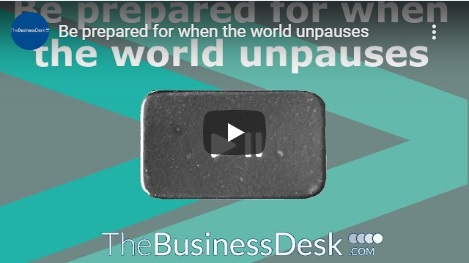Webinar: Be prepared for when the world unpauses

Our panel, chaired by TheBusinessDesk.com’s Yorkshire editor Ben Ormsby, was:
Roger Hutton, joint managing partner, Clarion
James Harding-Terry, managing director, Steetley Corner Group
Mandy Ridyard, finance director, Produmax
Gareth Harris, regional head of restructuring, RSM
In the latest virtual seminar from TheBusinessDesk.com, a panel of experts looked at the impact of Covid-19 on the economy, how businesses should be preparing for the world unpausing and what will have changed when the situation is all over.
When looking the impact of Covid-19 on the business world Gareth Harris, regional head of restructuring at RSM, said, “things may have changed quite significantly” for businesses as a result of the pandemic. From an economics perspective he highlighted that, “there isn’t a market that hasn’t been affected by this”, and as result there isn’t a business that hasn’t been affected.
For James Harding-Terry, co-owner and managing director of Steetly Corner Group of companies, he knows the future for all businesses could be challenging. He said: “The world that we face in the next few months is going to be very different for all of us.” He highlighted that businesses will be returning to work, but that most he suspects will still be operating under social distancing guidelines for a substantial amount of time, which will bring new challenges. However, he also highlighted the importance of leaders understanding the Government’s rules, adding: “There are companies at this point in time that could be operating and are not operating. The message very clearly has to be out there to all the business leaders in every sector, if you can go to work, you should be going to work, you should be creating momentum back into our economy.”
However, what changes will this pandemic bring to businesses beyond the financial impact? Mandy Ridyard, finance director at aerospace engineering firm Produmax, said: “I think regionalisation is one of the things that might come out of this crisis.”
She said Produmax imports and exports globally and as a result of the Coronavirus situation it has had to find new ways to places such as the Philippines. She added: “We have tried to make sure we secure our home supply chain where we can, or that our supply chain has got enough stock for us to overcome certain issues. We’re also finding different ways of doing things, which we hadn’t looked at before such as getting product to or from different places. So it’s about really being creative, about how to get through it and regionalisation is one of the aspects of that.”
Harris said one of the things being seen in supply chains is a renewed focus on risk as well as cost, stating: “A lot of people have gone for the lowest cost manufacturers or the lowest cost supply, just to try and drive down the cost and increase their profits. I think now there’s a balance to strike between the risk in your supply chain versus lowest cost. If ultimately you are heavily exposed to supply chains from around the world, I think that will change.”
Roger Hutton, joint managing partner at Clarion, followed this up. “I would say this is an opportunity in a number of ways,” he said. Hutton spoke about the fact the challenges businesses are facing are universal and the same up and down the supply chain. He suggested: “Everyone just needs to broker deals, share the pain and work in partnerships in a collegiate fashion. If you do that, I think the bond is going to be deeper and stronger.” He said this would result in businesses creating, “longer lasting relationships coming out the other side of it”.
So how should businesses prepare for the unpausing? There is no single answer, but the panel provided four key tips for businesses:
1) Start planning now, even though the short-term future is unknown. Be agile, plan for several different outcomes, and be ready to implement those plans as soon as you have any certainty
2) The more research you do and the more knowledge you can get at the moment about your market and potential markets is the key to reaching the springboard for your business post COVID
3) Stay positive, hold your nerve and plan now for what you want your business to look like when it comes out the other side – there will never be a better opportunity to make changes if required
4) Deepen relationships. Within your own business it is important for everyone to understand the immediate plan and their role in it, as engaged businesses will come out stronger. Equally, outside the business it is important to better understand the issues of your suppliers and customers. Good communication and partnering will help build long and better relationships that will serve you well on the other side of this









